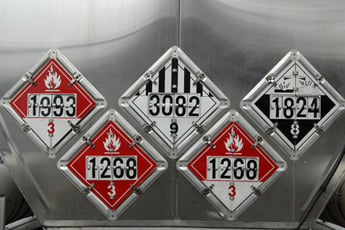Why Temperature Integrity Is Of Utmost Importance In Hazardous Goods Preservation?

Hazardous goods are products that are considered to be potentially dangerous to human health or the environment. These products need to be stored in a controlled environment that ensures their safety and integrity. Let us begin from the basics of understanding what does temperature integrity mean in the world of preservation. Discover the risks of temperature fluctuations, how they can impact the quality and safety of hazardous goods, and the importance of maintaining a consistent temperature throughout the preservation process. Find out how temperature monitoring and control can ensure the integrity of hazardous goods, and the best practices for achieving this in your operations. Don’t compromise on the safety and quality of your hazardous goods.
Temperature integrity refers to the ability of a storage facility to maintain a consistent temperature within a predetermined range. This temperature range is critical for the preservation of hazardous goods, as it ensures that they remain stable and do not degrade or become hazardous. Temperature integrity is achieved through the use of advanced cooling systems, insulation, and monitoring equipment.
Safety: The primary reason for maintaining temperature integrity in hazardous goods preservation is safety. Many hazardous materials are temperature-sensitive and can become unstable or even explosive if they are not kept within a specific temperature range. For example, certain chemicals may decompose or react violently if they are exposed to high temperatures. This can cause significant harm to people and the environment. If hazardous goods are not stored and transported at the correct temperature, they can pose a severe risk to workers and the public. For example, if chemicals are exposed to high temperatures, they can release toxic fumes that can harm people’s health. If flammable materials are not stored at the correct temperature, they can become volatile and cause explosions or fires. Maintaining temperature integrity is, therefore, critical in preventing accidents and protecting people’s safety.
Regulatory Compliance: There are strict regulations governing the transportation and storage of hazardous goods. These regulations require that hazardous goods be stored and transported in a manner that ensures their safety and stability, including maintaining specific temperature ranges. Failing to comply with these regulations can result in fines, legal action, and damage to your company’s reputation. The transportation and storage of hazardous goods are subject to a range of regulations and standards. For example, the International Air Transport Association (IATA) provides guidelines for transporting hazardous goods by air, while the International Maritime Organization (IMO) sets out regulations for shipping hazardous materials by sea. These regulations cover all aspects of hazardous goods transportation, including temperature control, and are designed to ensure that hazardous goods are transported and stored safely and securely.
Product Quality: Maintaining temperature integrity is also important for maintaining the quality of hazardous goods. Many hazardous materials are sensitive to temperature changes, and exposure to high or low temperatures can cause them to degrade or lose their effectiveness. This can be particularly important for pharmaceuticals or other materials used in medical settings, where quality and efficacy are critical. For example, vaccines and certain medications must be stored at specific temperatures to maintain their effectiveness. If these products are exposed to temperatures outside of the recommended range, they can become ineffective, reducing their ability to protect patients against disease. Maintaining temperature integrity is, therefore, essential in ensuring that hazardous goods retain their quality and effectiveness.
Cost Savings: Finally, maintaining temperature integrity can also help you save money. If hazardous goods are not stored or transported at the correct temperature, they may become unstable or unusable, which can result in lost product and lost revenue. By ensuring that your hazardous goods are stored at the correct temperature, you can avoid these losses and ensure that you are getting the most out of your investment. For example, if a shipment of hazardous goods becomes unstable due to exposure to high temperatures, it may have to be disposed of, resulting in significant costs. If hazardous goods become ineffective due to exposure to temperature changes, they may need to be replaced, resulting in additional costs. By maintaining temperature integrity, you can avoid these costs and ensure that your hazardous goods are stored and transported safely and effectively. Hazardous goods are often expensive and require careful handling and storage.


